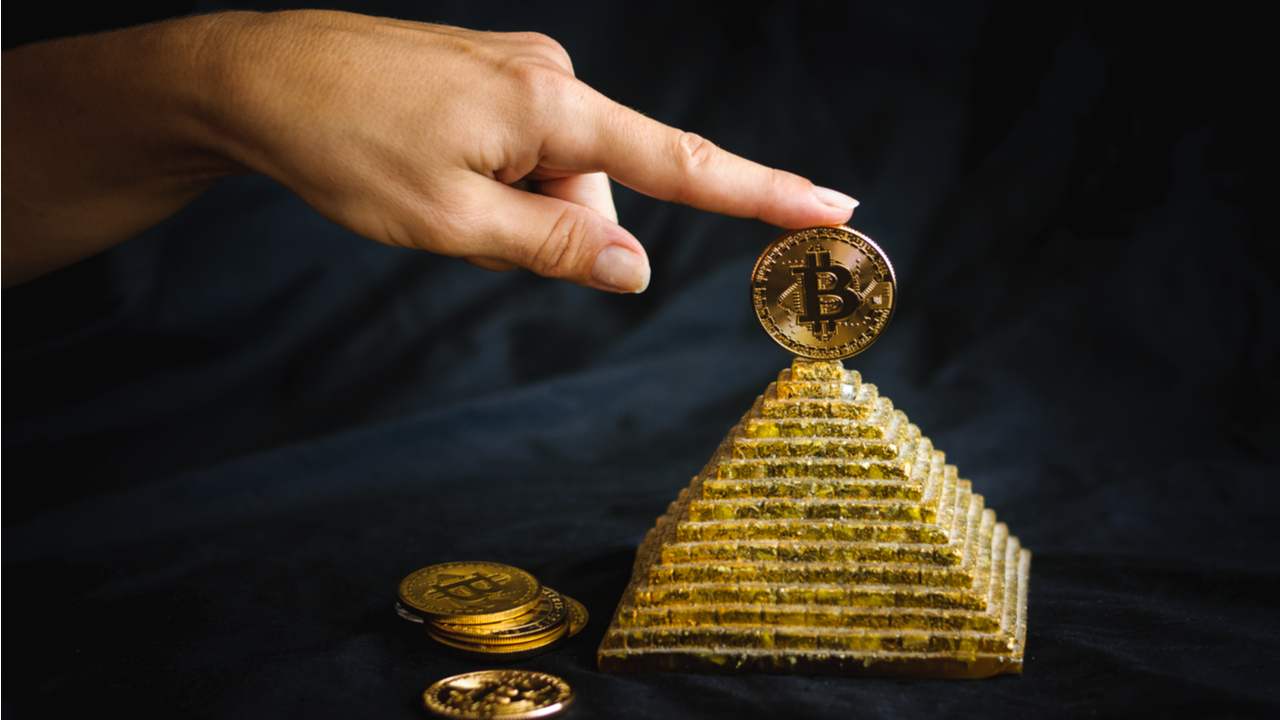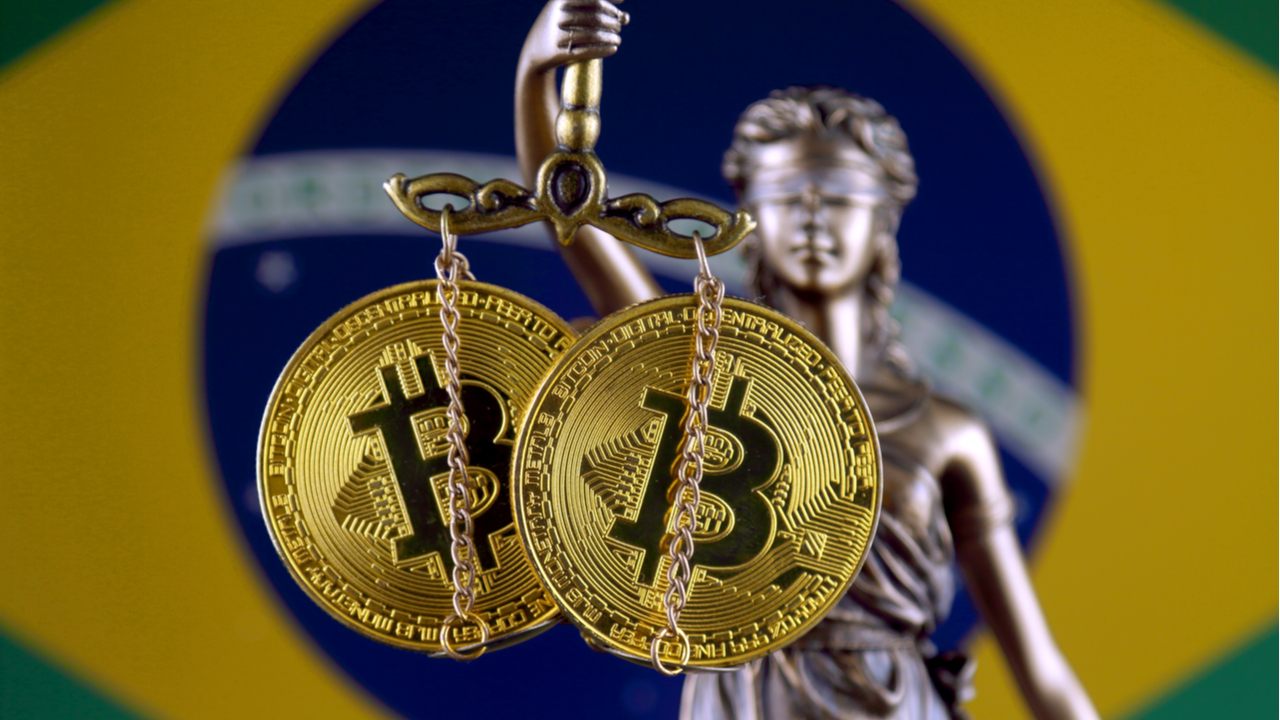 Rich Dad Poor Dad author Robert Kiyosaki has answered multiple questions about bitcoin and the U.S. dollar. Declaring that he is a bitcoin bull, the famous author said the cryptocurrency “is the perfect asset at the right time.” While acknowledging the possibility of bitcoin “going to zero,” he countered by suggesting that fiat currencies like […]
Rich Dad Poor Dad author Robert Kiyosaki has answered multiple questions about bitcoin and the U.S. dollar. Declaring that he is a bitcoin bull, the famous author said the cryptocurrency “is the perfect asset at the right time.” While acknowledging the possibility of bitcoin “going to zero,” he countered by suggesting that fiat currencies like […]
Ponzi schemes promise returns generated from the money of future investors, while in pyramid schemes, income flows up through recruitment.
Both schemes defraud investors by making alluring but false promises, and the majority of participants ultimately suffer large financial losses.
Individuals can protect themselves from these fraudulent schemes by understanding their differences. Here are key differences between both schemes:

The legal implications of participating in Ponzi schemes include possible fraud, embezzlement and securities fraud accusations. If found guilty, a prison sentence may follow; the length of the penalty depends on the scope of the crime.
Victims may receive restitution in the form of criminal fines, and law enforcement may seize property and vehicles that were obtained through deception. The courts may also compensate victims to make up for their monetary losses.
In a pyramid scheme fraud, victims have the option to file civil actions in an effort to recover damages and hold the scheme’s promoters accountable. To safeguard customers and uphold market integrity, regulatory bodies continuously monitor and look into pyramid schemes. Still, investors should exercise caution and conduct due diligence before making any investment decisions
Sadly, pyramid schemes have entered the cryptocurrency field, preying on the allure of rapid wealth in this emerging market.
Pyramid schemes frequently raise red flags because they promise extraordinarily high returns and place an inordinate emphasis on recruiting new participants rather than providing real goods or services. The perpetrators of cryptocurrency pyramid schemes frequently give only general or ambiguous details regarding their methods of return generation or investing plans. However, due to the inherent volatility of digital assets, there are no assurances in the world of cryptocurrencies. Any investment that promises profits should be avoided.
There are frequently no genuine products or services offered in pyramid scams. Instead of actual business operations, recruitment and investments make up the majority of the scheme’s revenue. Furthermore, pyramid schemes may offer complicated compensation plans that are challenging to comprehend. If one cannot understand how the strategy generates profits, they should proceed with caution.
A well-known example of a mix of Ponzi and pyramid schemes is OneCoin, which ran from 2014 to 2017. It was marketed as a cutting-edge digital currency that used advanced blockchain technology. However, it was opaque and lacked true blockchain capabilities. The scheme’s main objective was to attract new participants by offering significant rewards to those who made OneCoin package investments and brought in new participants.
A pyramid scheme is a dishonest investment plan that lures people with claims of large profits, usually by recruiting new participants.
Individuals involved in a pyramid scheme are required to make an initial financial investment, and rather than engaging in genuine product or service sales, their primary emphasis is on convincing others to become part of the scheme. A hierarchical pyramid structure is created by the new recruits’ responsibility to bring on new recruits, who will bring on more participants. Early participants frequently receive payments for their profits from later investors, giving the appearance of prosperity.
As it gets harder to find new partners to support the ever-expanding pyramid, pyramid schemes are unsustainable and doomed to fail. Those at the top profit when they eventually collapse, usually at the expense of those lower down the hierarchy who lose their investments. Due to their exploitative character and the harm they inflict on innocent people who fall prey to them, pyramid schemes are prohibited in many countries.
Pyramid schemes opt for the same model as multi-level marketing (MLM). However, MLM participants can make commissions from both the sale of these products and from recruiting new members. In contrast, legitimate products or services are frequently absent from pyramid schemes, and the main emphasis is on recruiting participants without offering real value.
The Telexfree case is an example of a pyramid scheme in the financial industry. While Telexfree, which ran from 2012 to 2014, purported to provide internet phone services, its main objective was participant recruitment. Investors were promised hefty profits in exchange for placing internet ads and recruiting new members. Thousands of people were duped before the scheme finally failed.
Ponzi schemes have infiltrated the cryptocurrency realm, preying on the attraction of rapid rewards in this developing market.
Examples of cryptocurrency Ponzi schemes include PlusToken, a massive hoax that deceived Asian investors out of billions of dollars, and Bitconnect, a lending platform that collapsed in 2018. These incidents highlight the value of caution and skepticism when entering the cryptocurrency market since the promise of easy money can occasionally mask sinister motives. Therefore, investors must learn to spot warning signs if they want to safeguard themselves against these fraudulent schemes.
Typically, these schemes lack openness regarding their investing strategies and make excessively high-return promises, frequently with guarantees. They often rely significantly on referral systems, put pressure on investors to move quickly, and avoid regulatory inspections or audits.
The fraudulent investment program known as a Ponzi scheme entices investors with the promise of extremely high profits.
The Ponzi scheme is named after Charles Ponzi, who gained popularity in the early 20th century for employing this method. It operates on a deceptive premise, where the returns paid to earlier investors come not from legitimate profits but from the investments of new participants. These schemes depend on a continuous infusion of new investors to support payouts because they lack a legitimate underpinning of commercial activity.
Ponzi schemes are infamous for their lack of transparency, frequently giving only vague or inaccurate information about how they work. These schemes are ultimately unviable and inevitably collapse when the flow of new investors decreases, leaving many investors with substantial losses. Ponzi schemes are illegal in most jurisdictions due to their fraudulent character, and authorities fiercely pursue them to protect investors from financial harm.
One of the most well-known Ponzi schemes in the financial sector was created by Bernie Madoff. His Ponzi scheme was discovered in 2008 after he acknowledged running a bogus investment company for many years. Madoff deceived his clients by pretending to be a legitimate investment firm and making them promises of consistent, large profits. But rather than really investing the money of previous investors, he used additional investments as leverage to pay rewards to them.
Madoff fabricated financial statements for years to keep up the appearance of success in this scheme. As a result of the scheme’s final collapse during the global financial crisis, hundreds of investors suffered enormous losses, and one of the biggest financial frauds in history was exposed. Later, Madoff was detained, found guilty, and given a 150-year prison term for his part in running this Ponzi fraud.

Gensler argued that securities laws helped prevent stock market scams once they were passed in the 1930s and can benefit the crypto market of today.
In a June 8 speech at the Piper Sandler Global Exchange & Fintech Conference, United States Securities and Exchange Commission (SEC) Chair Gary Gensler compared the current crypto market to the 1920s U.S. stock market, saying that it is full of “hucksters,” “fraudsters,” and “Ponzi schemes.” Just as Congress cleaned up the stock market by enacting securities laws, the current SEC can also clean up the crypto market by applying these laws, he argued.
JUST IN: SEC Chair Gary Gensler says crypto is all "hucksters, fraudsters, scam artists." pic.twitter.com/1xRWUMzbel
— Milk Road (@MilkRoadDaily) June 8, 2023
In the talk, Gensler praised the Securities Act of 1933 and Securities Exchange Act of 1934, claiming that these laws allowed the U.S. securities markets to “thrive” over the next 88 years. He argued that the “crypto securities markets” of today should also benefit from these laws, as they are not “less deserving of the protections” they provide.
Pointing to a court ruling against Telegram Open Network, Gensler argued that crypto asset securities are not exempt from securities laws even if they have utility.
“Some promoters of crypto asset securities contend that their token has a function beyond simply being an investment vehicle," Gensler stated. " As the courts in the Telegram case and others have said, however, some additional utility does not remove a crypto asset security from the definition of an investment contract.”
Related: SEC’s crypto actions surged 183% in 6 months after FTX collapse
This means that crypto security exchanges must comply with securities laws, including the requirement to separate “the exchange, broker-dealer, and clearing functions,” Gensler stated. In his view, this separation “helps mitigate the conflicts that can arise with the commingling of such services.”
Gensler denied that this separation isn’t possible, saying that separating these three functions simply requires work.
The SEC head argued that the current crypto market is rife with scams that have arisen because of the industry’s lack of compliance with securities laws, stating:
“With wide-ranging noncompliance, frankly, it’s not surprising that we’ve seen many problems in these markets. We’ve seen this story before. It’s reminiscent of what we had in the 1920s before the federal securities laws were put in place. Hucksters. Fraudsters. Scam artists. Ponzi schemes.”
The solution, in Gensler’s view, is to make sure that crypto securities issuers comply with the law. This is because these scams are “more likely to happen in markets whose issuers and intermediaries fail to comply with foundational laws.”
As chair of the SEC, Gensler has been heavily criticized within the crypto industry, especially since the SEC filed lawsuits against crypto exchanges Binance and Coinbase. Critics say he has an overly expansive view of the SEC’s regulatory authority and is driving innovation out of the U.S.

A Republican senator says that advancements in technology is exposing the fragility of the US banking system. In a new CNBC interview, Louisiana Senator John Kennedy says banks today are no different than the scheme ran by Italian con artist Charles Ponzi over 100 years ago. According to Kennedy, banks can only survive on the basis […]
The post Republican Senator John Kennedy Calls Banks Sophisticated Ponzi Schemes appeared first on The Daily Hodl.
 The California Department of Financial Protection and Innovation (DFPI) has cracked down on 11 cryptocurrency companies that are accused of violating California securities laws. Nine of the firms reportedly solicited funds from investors in order to trade cryptocurrencies on the customer’s behalf. One of the accused companies pitched an alleged metaverse software development scheme, and […]
The California Department of Financial Protection and Innovation (DFPI) has cracked down on 11 cryptocurrency companies that are accused of violating California securities laws. Nine of the firms reportedly solicited funds from investors in order to trade cryptocurrencies on the customer’s behalf. One of the accused companies pitched an alleged metaverse software development scheme, and […] Many of the financial pyramids identified in Russia during the first quarter of the year have been associated with cryptocurrencies, a top central bank official has revealed. Fraudsters are actively exploiting the hot topics of the day, including the sanctions theme. Pyramids Offer Russian Investors Ways to Circumvent Western Sanctions Amid growing financial uncertainty, Ponzi […]
Many of the financial pyramids identified in Russia during the first quarter of the year have been associated with cryptocurrencies, a top central bank official has revealed. Fraudsters are actively exploiting the hot topics of the day, including the sanctions theme. Pyramids Offer Russian Investors Ways to Circumvent Western Sanctions Amid growing financial uncertainty, Ponzi […] Aureo Ribeiro, a federal deputy in Brazil, stated that bitcoin might become a recognized currency in Brazil soon, during an interview with local media. The politician stated that Brazilians may be able to purchase houses, cars, and even fast food at McDonald’s with cryptocurrency in the near future. Bill 2.303/15, which regulates cryptocurrencies, might approve […]
Aureo Ribeiro, a federal deputy in Brazil, stated that bitcoin might become a recognized currency in Brazil soon, during an interview with local media. The politician stated that Brazilians may be able to purchase houses, cars, and even fast food at McDonald’s with cryptocurrency in the near future. Bill 2.303/15, which regulates cryptocurrencies, might approve […] The Central Bank of Russia has recently expanded its database of financial market players suspected of illicit activities. Several crypto companies have been added to the list along with entities bearing signs of Ponzi schemes, as well as illegal credit organizations and forex dealers. Central Bank of Russia Blacklists Crypto Platforms As part of its […]
The Central Bank of Russia has recently expanded its database of financial market players suspected of illicit activities. Several crypto companies have been added to the list along with entities bearing signs of Ponzi schemes, as well as illegal credit organizations and forex dealers. Central Bank of Russia Blacklists Crypto Platforms As part of its […] China’s cryptocurrency transactions related to criminal activities have decreased significantly over the past couple of years, a new report suggests. At the same time, its special administrative region of Hong Kong is seeing a spike in crypto-related crime this year, with authorities attributing the rise to the popularity of crypto investments. Chinese Crime-Related Crypto Transactions […]
China’s cryptocurrency transactions related to criminal activities have decreased significantly over the past couple of years, a new report suggests. At the same time, its special administrative region of Hong Kong is seeing a spike in crypto-related crime this year, with authorities attributing the rise to the popularity of crypto investments. Chinese Crime-Related Crypto Transactions […] It has been more than six months since the Central Bank of Nigeria (CBN) directed banks to stop serving customers from the cryptocurrency industry. While the measure appears to have succeeded in removing crypto entities from the banking ecosystem, the policy has however led to the growth of peer-to-peer trading. ‘Central Bank of Nigeria’s Actions […]
It has been more than six months since the Central Bank of Nigeria (CBN) directed banks to stop serving customers from the cryptocurrency industry. While the measure appears to have succeeded in removing crypto entities from the banking ecosystem, the policy has however led to the growth of peer-to-peer trading. ‘Central Bank of Nigeria’s Actions […]